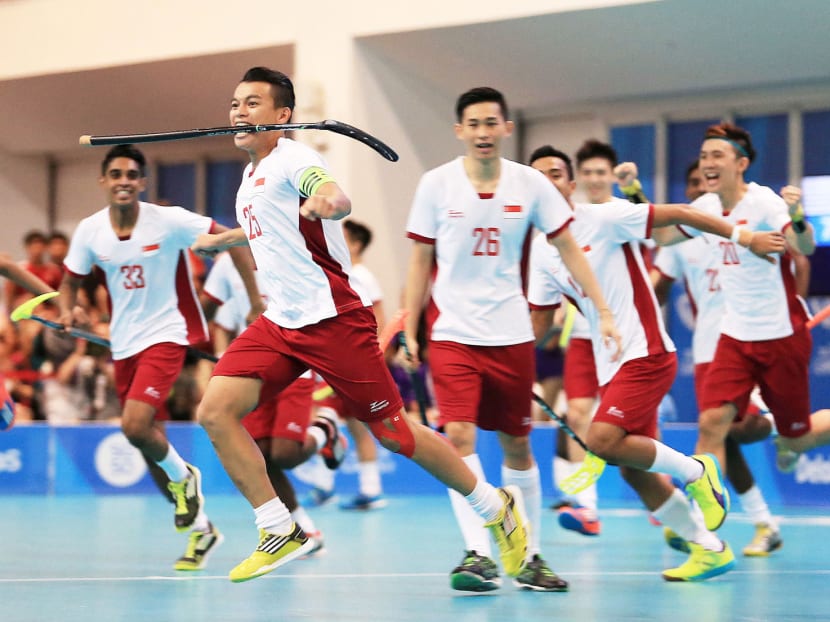Building on S’pore’s success
SINGAPORE — Home to the Republic’s elite athletes, the Singapore Sports Institute (SSI) has been credited for playing a crucial role in helping the nation achieve its best-ever performance of 84 gold, 73 silver and 102 bronze medals at the 28th SEA Games.

The Singapore men’s floorball team won gold at the SEA Games. The SSI is looking to broaden its reach and deepen its level of involvement in sports beyond the core ones such as football, table tennis and swimming. Photo: Wee Teck Hian
SINGAPORE — Home to the Republic’s elite athletes, the Singapore Sports Institute (SSI) has been credited for playing a crucial role in helping the nation achieve its best-ever performance of 84 gold, 73 silver and 102 bronze medals at the 28th SEA Games.
As Lawrence Wong, Minister for Culture, Community and Youth (MCCY) acknowledged that the government’s investment in sports has paid off with the successful organisation of the Games and the athletes’ overall performances, the MCCY and Sport Singapore (Sport SG) are keen to build on the success of the home Games for the future.
While sports gunning for success at the Asian and Olympic Games had previously received priority for sport science support, the plan is to extend the SSI’s services — which includes sport science (sports psychology, biomechanics), sports medicine and athlete development — beyond core sports such as football, table tennis and swimming.
“We are seeing the investments that we’ve put into sports paying off, all the investments we’ve provided, (the) Sports School, sports excellence scholarships, high-performance sports system,” said Wong in a post-Games press conference at Swissotel the Stamford yesterday.
“One of the things we’re looking at going forward is ... seeing how we can, for example, continue with support for subsequent major campaigns, be it future SEA Games, Asian Games and the Olympics, and how can we provide similar support that will enable our athletes to go as far as possible, how can we strengthen our support, high performance sports system to provide good support, research, sports science good coaching, resources in sports where we have the potential to do well.”
Sport SG CEO Lim Teck Yin, who is also chairman of the Singapore SEA Games Organising Committee, also said: “We are starting to look carefully to see what it takes to develop a system to broaden our reach and deepen our level of involvement. We are now working with a few hospitals to extend our reach and depth of support (in sports medicine) so it applies to psychology and biomechanics.
“The SSI must maintain a strong core of high-level, world-class expertise, to know what’s at the cutting edge of sports science and endeavour through indigenous capabilities and networking to bring that to bear in the most cost-effective way. It is something we are reviewing as the next phase for SSI in collaboration with the sports school that’s also doing a review of sports science support for youth athletes.”
Aside from Singapore’s 747-strong contingent’s record haul — they finished second among the 11-nation medal table, just behind powerhouse Thailand — the Games have also been a success on other fronts, attracting more than S$80 million in sponsorship from some 100 companies, while the 36 sports competed across 31 venues islandwide attracted over 500,000 spectators, with a number of sports like fencing, swimming, football and gymnastics sold out.
But Wong said yesterday that Singapore is unlikely to host bigger multi-sports events like the Asian or Commonwealth Games.
“The Asian Games are on a much bigger scale than the SEA Games with more sports and more countries and venues and infrastructure come into play. To be realistic, it will be very hard, but I’m not ruling it out in the future,” he said.
However, there is a possibility that Singapore could host other smaller-scale events such as the World University Games, Special Olympics, or single sport events like the FINA World Junior Championships in August. The ASEAN University Games are also scheduled to be held here next year.
Wong is confident the biennial event will be back soon, although he ruled out the Republic taking on the 2019 edition after Brunei’s decision to pull out. He added: “We are likely to see the SEA Games again well before 22 years, but four years is too short a time.”





